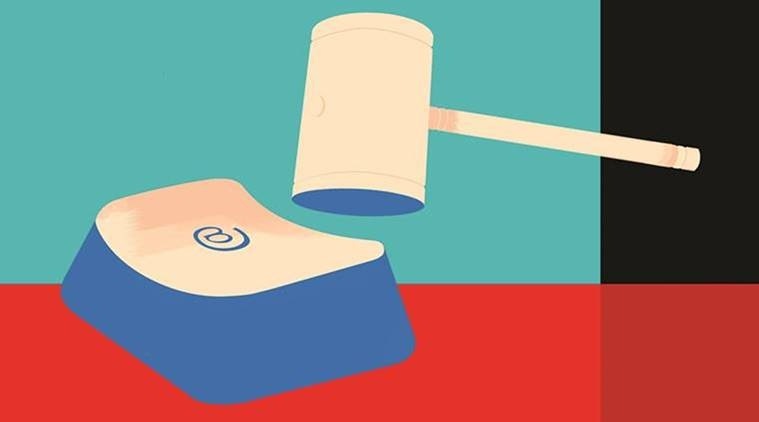 Prosecutors, meanwhile, said they will face an issue with continuity where witnesses have given part of their testimony, while setting up adequate infrastructure, too, remained a concern. (Representational)
Prosecutors, meanwhile, said they will face an issue with continuity where witnesses have given part of their testimony, while setting up adequate infrastructure, too, remained a concern. (Representational)
A courtroom presided over by a judge, a row of lawyers including the prosecution and the defence, accused persons in the enclosure at the back and witnesses in the witness box — the scene in a typical criminal trial may be have to make way for “court points”, “remote points” and a “live link” soon. With all criminal trials stalled since the lockdown in March, lawyers and legal experts say adapting to newer ways to resume the trials remain a challenge.
From witnesses who have completed part of their testimony before the abrupt pause due to the lockdown, to imprisoned undertrials having no access to judges and lawyers due to the restrictions in bringing them to court, criminal trials have been in limbo for about three months.
Among the ones in midtrial before Mumbai city civil and sessions court were the Sheena Bora murder case, in which accused Indrani Mukerjea, Sanjeev Khanna and accused-turned-approver Shyamvar Rai remain behind bars with over 60 witnesses examined so far; a trial against six jail staffers of Byculla jail arrested for the 2017 murder of inmate Manjula Shetye; the 2008 Malegaon blast case; and three other cases involving accused linked with the Islamic State, including Kalyan youth Areeb Majeed, who represents himself before the court.
Both defence lawyers and prosecutors say that conducting trials virtually may not be feasible, but with many stalled, involving undertrials behind bars booked in serious cases facing charges of murder, terror, money-laundering who are not eligible for temporary bail as per the high-powered committee’s recommendation to decongest jails, lawyers say remote hearings should be given a chance wherever possible.
“The accused are behind bars pending trial and the regular trial, as per normal circumstances, may not commence for a few months at least in Mumbai where the (Covid-19) cases are increasing. Virtual hearings may be given a try wherever possible,” said lawyer Niranjan Mundargi, representing Khanna, one of the accused in the Sheena Bora case, lodged in Arthur Road jail.
In another case, in which five men from Nanded have been behind bars since nearly eight years in an alleged terror plot, lawyer Sharif Shaikh said he has made a plea for the court to direct the prosecution to make written submissions to complete final arguments in the case for the judgment to be pronounced.
Last week, the Bombay High Court issued a Standard Operating Procedure recommending subordinate courts to record evidence through video-conference in cases where both parties agree and substantial part of the trial has been completed.
The Supreme Court’s e-committee has circulated draft rules for video-conferencing for courts among all the High Courts for consideration by the judges. The rules, which include guidelines for conducting trials recommend setting up a ‘court point’ as a courtroom, a designated software, and a ‘remote point’ where other parties can join.
It also specifies the role of a court-appointed coordinator at both points to ensure impartial and independent proceedings, including the witness is not tampered with and members of public be allowed to hear to observe requirements of open court proceedings.
Retired Justice R C Chavan, the vice-chairman of the e-committee in Supreme Court, said that a programme for training all stakeholders in e-filing has been launched. “The wheels of justice should keep moving. Such a step is suggested for the benefit of litigants as well as lawyers to ensure that post-unlock one situation, social-distancing and ensuring safety and security of all,” Justice Chavan said. He added most of the proceedings can be conducted through remote hearings and exceptions can be made in cases requiring parties to remain present.
He said in cases where medical experts and police are witnesses, their current duties in the pandemic may mean prolonging the trial, and hence they can be examined through video-conference.
In cases involving child sexual abuse, Persis Sidhva, programme manager, Legal Services at Majlis Legal Centre, said they have received apprehensions from victims’ families that the delay may favour the accused. “In most cases, since the parents or guardians of children, who have faced abuse want them to recover faster from the trauma, steps are taken towards it. A prolonged trial also prolongs their trauma,” she said.
Sidhva feels that if access to technology can be ensured to victims and witnesses, a video trial can be worked out.
Prosecutors, meanwhile, said they will face an issue with continuity where witnesses have given part of their testimony, while setting up adequate infrastructure, too, remained a concern.
Some defence lawyers, however, said the virtual trial may be used only for non-material witnesses. Lawyer Wahab Khan, who is conducting the 26/11 terror attack trial via video-conference since a few years as accused Zabiuddin Ansari represented by him is not produced before court citing security concerns, said, “In a trial, the court also has to take into account the demeanour of the witness while deposing. If the witness is not present before the court, concerns about him or her being tutored also remain. Non-material witnesses, like those who have done panchnamas, can be conducted as a time-saving measure for now.”
Khan and other defence lawyers added while there have been many instances of witnesses based in other countries being examined over video-conference, concerns of ensuring confidentiality between clients and them also is difficult in virtual hearings when the accused is in jail and under watch by prison authorities.
Retired justice Chavan said that privacy issue can be addressed. He added that each High Court committee can decide on the draft rules and the steps to take going forward.